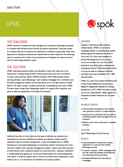Case studies
UPMC
Overview
Located in Harrisburg, Pennsylvania, UPMC is a nationally recognized leader in providing high-quality, patient-centered healthcare services to more than 1.2 million area residents in central Pennsylvania and surrounding rural communities. Its more than 2,900 physicians and allied health professionals and approximately 11,000 employees serve a 10-county area at outpatient facilities and eight acute care hospitals with 1,360 licensed beds.
UPMC is a Joint Commission Top Performer in Key Quality Measures and became a Magnet® designated hospital for nursing excellence in 2017. UPMC has been named one of the “Most Wired” health systems in Hospitals & Health Networks for 19 years in a row.
Industry
- Healthcare
Business drivers
- Channel alerts and alarms from patient care systems to staff on mobile devices
- Improve communications among staff to coordinate patient bed management and transport
- Reduce noise that is disruptive to patient recovery
Solution
- Clinical alerting
Results
- Improved patient experience: quicker response to nurse call and a faster discharge process
- A quieter hospital: 1,400 messages sent per day, reducing hallway conversations and overhead announcements
- Increased efficiency and accuracy of messages
The challenge
UPMC wanted to change their bed management and patient discharge processes to increase staff efficiency and improve the patient experience. They also sought to increase staff communications for patients on ventilators, particularly when they experienced respiratory distress and required fast clinician response. The challenge was to coordinate all of these communications and integrate the chosen solution with the technology already in place.
The solution
UPMC evaluated several vendors and decided to work with Spok due to its experience in helping hospital staff improve productivity and communications through mobile alerting. Spok clinical altering software is HIPAA-compliant, FDA 510(K)-cleared, receives messages from ventilators and the bed management system, and pushes alerts out to the right person’s mobile device. This spans nurses, transport personnel, housekeeping, and more. UPMC uses a single system to support both hospitals and plans to add the capabilities at the West Shore facility.
Additional benefits of using Spok are the ease of adding new systems and expanding the service to additional locations and devices. Initially used for respiratory alarms and bed management, a new Orthopedics floor at UPMC Harrisburg is using Spok clinical alerting to incorporate patient monitoring and nurse call with a patient room and bed management system. Secure text alerts are sent to staff phones when a patient pushes the nurse call button, requests medication, or needs assistance getting up. Future automated alerts will include bed-specific information including if a fall-risk patient tries to climb out of bed without assistance, a bed brake is not on, or if the bed is not lowered to the proper position.
The emergency department (ED) recently implemented a new system to monitor the number of patients waiting to be treated. When there are more than 19 patients waiting at UPMC Harrisburg, or eight at the UPMC Community Osteopathic, the monitoring system tells Spok. Spok then sends secure text alerts directly to relevant staff on their phones letting them know they are needed in the ED to help address the patient volume.
The staff using it on a day-to-day basis don’t need to think about it. They are just able to respond quickly to our patients using mobile communications.
– Chris Hunsinger, Telecommunications Technician
The result
“When we have a bed change, the discharged patient needs to be transported, and the room needs to be cleaned before a new patient can be brought in,” said Chris Hunsinger, Telecommunications Technician for UPMC. “There’s a whole team involved, and it’s a coordinated effort. [Spok] Messenger sends messages to Wi-Fi phones and/or pagers and has made the process much smoother.”
Spok’s clinical alerting solution is also helping reduce sounds in the facility. “We used to use phones to call and ask for beds to be moved. When a text is sent there’s not the noise of someone talking on the phone and walking down the hall. It’s an efficient method that is also more discreet,” Hunsinger said.
In addition to reducing conversation, implementing the new staff workflow has also shortened some alarms. When ventilators on the respiratory floor at the Harrisburg campus sound alerts, texts are sent directly to staff on their phones. Staff respond quickly to check patients, also silencing the alarm sooner than before. Having the ability to send alerts directly to staff is a gentler, quieter way to manage patient care. “We’re a quiet hospital, so we don’t make overhead announcements or use alarms unnecessarily if messages can be pushed through like this,” Hunsinger said. “We’re very focused on the patient experience.”
Sending messages to staff is not only less disruptive and more efficient, it’s also more accurate. “When texts are sent, no translation is needed, and there’s no paper,” Hunsinger pointed out. “Staff look right at the information and know what it is. It’s also very fast—just the push of a button.”
And what do staff think of Spok clinical alerting? “The only people who know about it are the ones behind the scenes. The purpose of the software is to be seamless. The staff using it on a day-to-day basis don’t need to think about it. They are just able to respond quickly to our patients using mobile communications.”
The future
UPMC is using 800 staff handsets between the Harrisburg and Osteopathic campuses, and more will be added at the West Shore Hospital. “During our deployment at the West Shore Hospital, we might use different types of phones, so we need the versatility [Spok] Messenger offers,” Hunsinger said.




